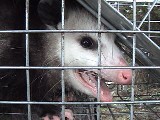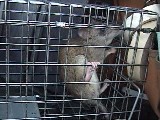 I mentioned in an earlier post a friend of mine who had caught 14 non-indigenous gray squirrels in her backyard in one week. Well, I have another couple of friends who, upon hearing strange noises on their roof at night, had traps set to catch whatever was up there. The first thing caught was a rat large enough to trip and stay inside of a trap designed for squirrels, followed a few days later by a possum, which looks an awful lot like a giant rat. Neither species are native to the area, of course.
I mentioned in an earlier post a friend of mine who had caught 14 non-indigenous gray squirrels in her backyard in one week. Well, I have another couple of friends who, upon hearing strange noises on their roof at night, had traps set to catch whatever was up there. The first thing caught was a rat large enough to trip and stay inside of a trap designed for squirrels, followed a few days later by a possum, which looks an awful lot like a giant rat. Neither species are native to the area, of course.
As a kid playing in the woods of Indiana, I would, on occasion, stumble upon dead opossums. One day it occurred to me that they might just be playing dead, like I had always heard they do. I went back once to check and sure enough, he was gone. You would swear they were dead. Stiff as a board, you could prod them with sticks and even pick them up by the tail and toss them. Playing dead is an involuntary reaction similar to a seizure that apparently has enough evolutionary advantages to remain in the gene pool. They don’t all play dead, so I suspect that this genetic trait is more common in some areas of the country than others.  Thanks to compost piles, pet-food containers, and bird feeders, Seattle has become a feedlot for rats, possums, squirrels, and raccoons. An eagle made a go at my daughter’s chickens last week and a mole has taken up residence in my street-side water-meter pit. Pound for pound, there is more wildlife in Seattle than you will find in most forests. There just isn’t much biodiversity (read: variety).
Thanks to compost piles, pet-food containers, and bird feeders, Seattle has become a feedlot for rats, possums, squirrels, and raccoons. An eagle made a go at my daughter’s chickens last week and a mole has taken up residence in my street-side water-meter pit. Pound for pound, there is more wildlife in Seattle than you will find in most forests. There just isn’t much biodiversity (read: variety).
I have an elderly neighbor who grew up in Seattle. As a little girl, she used to catch lizards and frogs in Wallingford. Imagine that, lizards and frogs in a Seattle neighborhood. The large red-bellied frog used to be so common in the Pacific Northwest they were used to supplement meals at lumber camps. You can’t find one now to save your life.
There is a direct inverse correlation between biodiversity and proximity with humanity that you will find anywhere you go on this planet. This suggests, as I have said so many times before, that giving us great cities to live in will give the rest of the planet’s inhabitants room to live as well.
 I mentioned in an
I mentioned in an 
